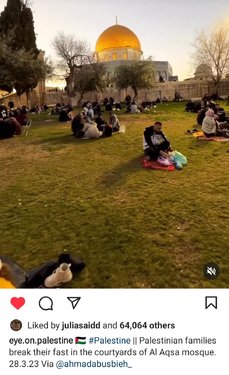-
Posts
8,434 -
Joined
-
Days Won
771
Content Type
Profiles
Forums
Events
Everything posted by ummtaalib
-
Anti-ballistic missiles and rockets were fired from Gaza in response to the Israeli military launched air strikes in the Gaza Strip on Friday, triggering sirens in several Israeli towns and cities bordering the strip. Hours earlier, rockets were fired from Lebanon into Israel on Thursday afternoon, amid repeated Israeli assaults on worshippers in Jerusalem’s Al-Aqsa Mosque this week.
-
Gaza attacked! The Israeli military launched air strikes on the Gaza Strip on Friday, hours after rockets were fired from Lebanon into Israel on Thursday afternoon, amid repeated Israeli assaults on worshippers in Jerusalem’s Al-Aqsa Mosque this week.At least five locations across the besieged enclave were hit just after midnight local time. There were no immediate reports of casualties Middle East Eye (@middleeasteye) • Instagram photos and videos
-
"The Contemporary Muslimah" is a short course designed to enable Muslim women to think deeply about and make critical decisions regarding their identity and how they conduct themselves in the world today. By unpacking ideas often taken for granted, it will invite participants to question their assumptions and their priorities, forcing them out of their comfort zones. The course covers a wide array of topics including mental and emotional health, feminism, women's leadership, the fiqh of dressing and beautification and the etiquettes of male-female interaction in various settings. It addresses common critiques on Islam's position on issues related to women such as polygamy, and clarifies the Islamic perspective on contentious contemporary issues like homosexuality and transgenderism. By putting into perspective the purpose of our existence and shedding light on how this purpose is to be achieved, it promises to go beyond being merely informative to being a truly transformative experience. This comprehensive course is a necessary anchor for Muslim women navigating the choppy waters of internal conflicts and the chaotic world they find themselves in today. It grapples with modern and post-modern realities while deeply rooted in the sacred knowledge tradition. A must for all contemporary muslimahs trying to lead a fruitful life in accordance with the Will of Allah and His Messenger (may Allah bless him and give him peace). The Contemporary Muslimah (whitethread.org)
-
Al-Aqsa under brutal attack @mintpress BREAKING NEWS | The Al-Aqsa compound, the third holiest site in Islam is under attack by "israeli" occupation forces. The Israeli occupation forces brutally beating Palestinian youth and worshipers inside Al Qibili mosque at Al Aqsa. 5.4.23 Horrific scenes coming through The Israeli occupation forces brutally beating Palestinian youth and worshipers inside Al Qibili mosque at Al Aqsa. 5.4.23
-
BREAKING Israeli soldiers are storming Al Aqsa Mosque during Ramadan, attacking and forcing all Palestinian worshippers out. IMEU (@theimeu) • Instagram photos and videos
-
-
Welcome Ramadaan Beautiful is the breeze that blows across the desert sands And the mighty waves that gently kiss the shore... Read more: MUBZ Welcome Ramaḍān by Bint Ebrahim.pdf
-
The following is an amazing incident from the life of Rasulullah (sallallahu 'alayhi wasalam) in which he successfully deters a young man from zina, and also teaches us a powerful and effective du'a for protection from vice. In an era like ours, wherein vice and immorality hides nowhere, this Hadith will prove very inspiring and very useful. Sayyiduna Abu Umamah (radiyallahu ‘anhu) reported: “A young man once came to Rasulullah (sallallahu ‘alayhi wa sallam) and said: ‘Permit me to commit zina.’ The people turned to him and rebuked him, saying: ‘Stop, stop.’ Nabi (sallallahu ‘alayhi wa sallam) said: ‘Come close.’ He came close and sat down. Nabi (sallallahu ‘alayhi wa sallam) asked: ‘Would you like that for your own mother?’ He replied: ‘No, by Allah, may I be sacrificed for you.’ Nabi (sallallahu ‘alayhi wa sallam) said: ‘Nor do people like it for their mothers.’ Nabi (sallallahu ‘alayhi wa sallam) continued: ‘Would you like it for your own daughter?’ He replied: ‘No, by Allah, may I be sacrificed for you.’ Rasulullah (sallallahu ‘alayhi wa sallam) said: ‘Nor do people like it for their daughters.’ He then asked: ‘Would you like it for your own sister?’ ‘No, by Allah, may I be sacrificed for you.’ replied the youngster. Nabi (sallallahu ‘alayhi wa sallam) said: ‘Nor do people like it for their sisters.’ He (sallallahu ‘alayhi wa sallam) then asked: ‘Would you like it for your paternal aunt?’ The young man replied: ‘No, by Allah, may I be sacrificed for you’, to which Nabi (sallallahu ‘alayhi wa sallam) replied: ‘Nor do people like it for their paternal aunts.’ Nabi (sallallahu ‘alayhi wa sallam) lastly asked him: ‘Would you like it for your maternal aunt?’ He replied: ‘No, by Allah, may I be sacrificed for you.’ Rasulullah (sallallahu ‘alayhi wa sallam) then said: ‘Nor do people like it for their maternal aunts.’ [From among the many warnings against zina found in the Quran Karim and the Hadiths, Rasulullah (sallallahu'alayhi wasallam) chose this manner of rationalising with him to deter him from this sin, as at times this is the most effective way.] Thereafter, Nabi (sallallahu ‘alayhi wa sallam) placed his hand on him and recited the following dua: اللَّهُمَّ اغْفِرْ ذَنْبَهُ، وَطَهِّرْ قَلْبَهُ، وَحَصِّنْ فَرْجَهُ Allahummaghfir dhambahu wa tahhir qalbahu wa hassin farjahu Translation: O Allah! Forgive his sin, purify his heart, and protect his chastity. The narrator says, ‘After that, this youngster did not pay attention to anything [forbidden].'” (Musnad Ahmad, vol. 5 pg. 256/257) When reciting this Dua for one's own self, the following words could be used: اللَّهُمَّ اغْفِرْ ذَنْبِيْ، وَطَهِّرْ قَلْبِيْ، وَحَصِّنْ فَرْجِيْ Allahummaghfir dhambi wa tahhir qalbi wa hassin farji Translation: O Allah! forgive my sin, purify my heart, and protect my chastity. Darul Hadith Research Centre Jamiatul Ulama (KZN)Council of Muslim Theologians
-
Q. I am a keen follower Jamiatul Ulama group from the UK. Alhamdulillah, what an inspiration. Can I please ask for any tips to prevent headaches/migraines during fasting? It would be extremely helpful. Response of Dr Farouk Haffejee (Durban) Headaches during Ramadaan are caused by a few factors: 1. Caffeine Withdrawal Headache - Caused by not having tea or coffee during the day on the first day of Ramadaan. Lasts for up to a week into Ramadaan. It is a sharp, pounding headache. Drinking tea, coffee and caffeine-containing drinks during the day as a habit makes us addicted to caffeine. Suddenly, on the first day of Ramadaan, there is no more caffeine during the day. It causes a headache, starting around 2 to 3pm and intensifying as the afternoon goes on, worse between Asr and Maghrib, sometimes accompanied by vomiting in people who have a lot of caffeine during their normal day. Solution: Start weaning yourself from caffeine drinks slowly, starting as soon as possible, until you are having no caffeine drinks during the day, for 2 or 3 days before Ramadaan starts. You can have tea or coffee in the morning and in the evening but stop drinking them during the day. Insha’Allah, the headaches won't come. 2. Hunger - Hunger can also cause headaches which appear towards the end of the day, worse between Asr and Maghrib. Solution: We must feel hunger during the fasting day. That is part of Ramadaan. But we can minimise it by eating correctly at Suhur. We must select foods that take a long time to digest. We must have a balanced meal with about half carbohydrates which must be complex carbohydrates. Refined carbohydrates digest very fast (sugar and sugar-containing foods especially cereals, white flour containing foods, white rice, pasta). Replace these with complex carbohydrates (Brown flour, brown bread roti made with brown flour, potatoes, sweet potatoes, yams, etc.) We then require proteins about 30% consisting of either animal protein (meat, chicken, fish, dairy products including eggs, etc.) or plant protein (beans, lentils, mushrooms, etc). The rest should be fats and oils which are helpful to us like olive oil, olives, avocado or some butter. 3. Dehydration - Headaches can be caused by dehydration. Again, these headaches appear towards the end of the day. Solution: Avoid working in hot environments and in the sun. Make sure that you are well hydrated at the beginning of the fast as our bodies cannot store water. We need to be 100% full when starting the fast. Judge by the colour of your urine. If it is dark when you wake up for Suhur, you are under hydrated. You need to drink more. If your urine is light in colour, you are well hydrated. To hydrate, we need water, juice, milk, soup, etc. 4. Inadequate sleep - This can cause headaches as well. Solution: Because of the shortened hours of sleep, it will help greatly to have a nap around Zuhr time (Qaylullah) which is a sunnah of Rasulullah sallallahu alayhi wasallam. That "power sleep", made with the intention of seeing you through Taraweeh salaah, will go a long way to keep discomfort from lack of sleep away. 5. Stress - Fasting accompanied by stress, may cause headaches. These headaches are usually throughout the day - dull, like a vice grip on the head. Solution: To take advantage of the month of Ramadaan and its rich blessings, we should re-organise our work schedule to minimise work and stressful situations and concentrate on pleasing Allah Ta'ala. Jamiatul Ulama (KZN) Council of Muslim Theologians
-
This Ramaḍān, raise the bar by learning and reflecting about the inner dimensions of fasting, the night prayer, iʿtikāf, Laylat al-Qadr and much more. Journey to Allah in Ramadan (Detailed Book) Deepen your relationship with Allah and accelerate your journey to Him 30+ reminders to taste the sweetness of iman and worship Just 7 minutes a day to read! DOWNLOAD My Ramadan Companion (Summary Book) 30 easy-to-read daily reminders and reflection exercises ‘Reflect and Act’ prompts to help you cultivate new habits An abridged version of ‘Journey to Allah in Ramadan’ Just 4 minutes a day to read DOWNLOAD lifewithallah.com
-
Rampage in Huwara Israeli settlers have set dozens of Palestinian homes and cars on fire in Huwara, a town in the occupied West Bank city of Nablus, in what appeared to be the worst outburst of settler violence in decades...article and piuctures at A-Jazeera
-
When we have to undertake a project, we invest a great deal of effort and time into ensuring the project will be successful. Projects are initiated, then planned out, then executed and monitored. And once they are completed, they are evaluated. If we can do this for projects at work, then surely the ‘project’ of Ramaḍān is far greater. As people seeking the pleasure of Allah and Paradise, Ramaḍān is the ‘dream project’ that has landed effortlessly on our desks. In order to prepare a plan which will help us to successfully complete this project, we have to be clear about its goals. These goals will provide the framework of a successful Ramaḍān. Everything we do in Ramaḍān should lead to the following goals: The Goals of Ramadan 1. Increase and strengthen your īmān Ramaḍān is the perfect opportunity to rejuvenate our īmān and accelerate our journey to Allah. We should strive to increase our īmān in Allah by increasing in our maʿrifah (knowledge) of Him, love for Him, fear of Him, hope in Him, trust in Him and sincerity to Him. Our īmān in Allah’s Angels, Prophets, Books, the Last Day and al-Qadr should also increase. 2. Embody servitude (ʿubūdiyyah) and submission Ramaḍān is the training ground to develop ʿubūdiyyah: where we becomes true servants of Allah through our constant humility and awe of him, and always expressing our dire need of Him. We can speed up our journey to Allah by infusing all our physical acts of worship with the quality of ʿūbūdiyyah. In our everyday lives, we are accustomed to giving in to our desires. If we feel like eating, we eat. If we feel like drinking, we drink. Through Ramaḍān, we should aim to train the nafs (inner self) to submit itself to Allah, and to comply with His commands. 3. Taste the sweetness of worship The goal of Ramaḍān should not be to just perform x number of good deeds. Every act of worship in Islam consists of both an outer manifestation (‘action of the limb’) and an inner reality (‘action of the heart’), which is its essence and core. We should aim to focus on these inner dimensions, through which we will taste the sweetness of worship inshāAllah. 4. Purify your heart One of the aims of Ramaḍān is to elevate the soul to its intended station: the tranquil soul. Ramaḍān is the perfect time to purify the heart from diseases such as envy, hatred, pride, anger, hypocrisy, hard-heartedness. When the heart is purified, it is less susceptible to the whispers of shayṭān, and more able to defend itself from doubts (shubuhāt) and desires (shahawāt). 5. Develop good character Excellent character is an integral part of our dīn, and there is no better time to cultivate this than in Ramaḍān. Our beloved Prophet g said, “When one of you enters the morning in the state of fasting, he should neither use obscene language nor act ignorantly. If anyone insults him or argues with him, he should say: ‘I am fasting, I am fasting’” (Muslim). Ramaḍān is the perfect time to become the best of Allah’s servants: those who bring the most benefit to others, those who treat their parents, spouses, children, families and wider communities with kindness and excellence. 6. Become attached to the Qur’ān and the night prayer Whilst the primary purpose of fasting is to gain taqwā, the purpose of Ramaḍān is to connect with the Qur’ān. Ramaḍān is the month of the Qur’ān. The Qur’ān is guidance, which is supposed to mould our lives. It is not merely to be beautifully recited. The recitation of the Qur’ān is supposed to increase our īmān and deepen the love and awe of Allah in our hearts. This will only occur if we recite with deliberation and reflection. Qiyām at night is one of the greatest acts of worship a servant can perform. It brings with it a sweetness which is nearly impossible to experience otherwise. By the time Ramaḍān ends, we should aim for the night prayer to become a habit so that we can make it part of our everyday lives throughout the year. 7. Bring your heart to your ṣalāh, dhikr & duʿā’ Ramaḍān is the perfect time to develop and train ourselves to perform ṣalāh, dhikr and duʿā’ with excellence. We should set specific goals in relation to how we are going to improve in each one e.g. increase khushūʿ, recite the evening adhkār with deep reflection, duʿā’ for a longer duration, and so on. 8. Develop consistency Ramaḍān is a bootcamp for cultivating our hearts, souls, morals and ultimately our lives, so that the obedience of Allah becomes our lifestyle. We should worship Allah in Ramaḍān with the mindset that our efforts are not limited to Ramaḍān; rather we want to transform our lives through it and make it a consistent part of our lives. 9. Attain Allah’s forgiveness, freedom from Hell-fire & entry into Paradise There are endless opportunities to be forgiven in Ramaḍān, gain freedom from Hell-fire and be admitted into Paradise. We should be determined to not miss out on any of these opportunities. 10. Tame your nafs to stay away from sins and attain taqwā One of the key goals of Ramaḍān is to tame the nafs and stop sinning. By refusing your nafs what it desires (food, drink, sleep), you develop self-control. This greater level of self-control should help you the next time you are tempted to sin. Ramaḍān is the time to elevate the soul from its base desires (stomach and private parts). Aim for your fasting and Ramaḍān to remove the love of the world from your heart; and let your soul soar high above the ground, away from the body, and upwards towards its Creator and Originator. A large number of goals can feel overwhelming. However, once you have understood the overall goals, do a self-analysis as to where you currently are and what you would like to focus on. Everyone is on their own unique journey. Perhaps you already perform the 5 daily prayers punctually, but your target is to build up a daily habit of ṣalāh al-ḍuḥā. Or perhaps you don’t struggle with envy, but you do struggle with anger, so you can focus on managing your anger this Ramaḍān. Ramadan: The Battle Against the Nafs Think of Ramaḍān as a battlefield. The enemy you are trying to defeat is your nafs. It is an enemy which has conquered you many times over in the past. This Ramaḍān, however, you are determined that by the help of Allah, you are going to conquer it. You are going to be the winner, and not the loser. This will require planning, effort, tonnes of duʿā’ and perhaps even a change in strategy. One such strategy is to manoeuvre around your nafs, and subtly trick it. When you are struggling to keep momentum, say to yourself: just a little while longer. After Ramaḍān, you can go back to enjoying the ḥalāl pleasures. For now, just keep going for a little while longer. Once, Bishr al-Ḥāfī r was walking with one of his companions towards a city. His companion wanted to drink water from a well. Bishr said to him, “We will drink from the next well that appears on the way.” Every time they would approach a well, Bishr would say, “From the next well.” When they finally reached their destination, Bishr said, “This is how we journey through the world.” We ask Allah al-Ḥayy (The Ever-Living), al-Qayyūm (The All-Sustainer) to make this Ramaḍān our best Ramaḍān, and we ask Him to not entrust us to ourselves for even the blink of an eye. lifewith allah
-
Heed the Warning! Load shedding… water cuts… floods… riots and looting… protests and shutdowns… xenophobic attacks… economic recession… These are some of the terms of doom and gloom that generally dominate the headlines, due to which people, by and large, have become overwhelmed by anxiety and worry. However, the question is, “What should a Muslim’s perspective be in the face of these various difficulties and hardships?” In the Quraan Majeed, Allah Ta‘ala says, “And indeed We sent (messengers) to nations before you (O Muhammad [sallallahu ‘alaihi wasallam]), then We seized them with hardships and sufferings so that they may supplicate in humility.” (Surah An‘aam v42) In this verse, Allah Ta‘ala explains the plight of the previous nations and the way that Allah Ta‘ala dealt with them. When the previous nations would reject their Ambiyaa (‘alaihimus salaam) and refuse to give up their evil and sinful ways, then Allah Ta‘ala would first send hardships and tests upon them as a ‘wake-up call’. The purpose for Allah Ta‘ala testing them with trials and tribulations is to make them turn to Allah Ta‘ala, become humble and repent for their wrongs. However, despite the admonishments sent by Allah Ta‘ala in the form of difficulties and hardships, they remained immersed in their disbelief and evils. In regard to these people who did not heed the warnings, Allah Ta‘ala says, “Why then, did they not supplicate in humility when a calamity from Us came upon them? Instead, their hearts were hardened and Shaitaan made the (evil) actions which they were carrying out attractive to them.” (Surah An‘aam v43) After the test of difficulties and hardships, when they did not pay heed, reform themselves and turn to Allah Ta‘ala in humility, then Allah Ta‘ala opened the floodgates of wealth upon them as a further trial to draw them towards their destruction. The more wealth they received, the more they drowned in the love of the material world and the more negligent they became in regard to fulfilling the injunctions of Allah Ta‘ala. At this point, Allah Ta‘ala still gave them respite and the chance to make amends, but when they did not avail of this chance, then Allah Ta‘ala sent such a punishment upon them which left them on their knees in a state of utter despair. Allah Ta‘ala says, “Thereafter, when they forgot the advice (and warnings which) they were given, We opened for them doors of everything (i.e. the doors of wealth and prosperity), until when they became proud of what they were given, We seized them suddenly (with divine punishment) and they were left in despair.” (Surah An‘aam v44) In these verses, Allah Ta‘ala explains to us the system which was adopted with the previous nations who went astray. At first, they would be subjected to calamities and hardships as a warning from Allah Ta‘ala. But when they failed to heed these warnings, then Allah Ta‘ala opened the floodgates of wealth to them, as a result of which they drowned themselves deeper in wealth, distanced themselves even further from Allah Ta‘ala and fell further into destruction. Though these verses directly refer to the previous nations, however the Ummah of Rasulullah (sallallahu ‘alaihi wasallam) is being addressed and warned that they should not tread on the same path of destruction which the previous Ummats had treaded upon. Sometimes, Allah Ta‘ala will test this Ummah with hardships and difficulties, and this will be a means for them to wake up from their slumber and negligence. At times, when the Ummah does not pay heed to the warning signals of Allah Ta‘ala, then Allah Ta‘ala can also open the floodgates of wealth for them, as a result of which they will distance themselves further from Allah Ta‘ala and drown further in affluence and wealth. Therefore, from these verses of the Quraan Majeed, we learn two important lessons: The first lesson is that the difficulties and hardships that we witness in the world are reminders and warnings from Allah Ta‘ala that should motivate us to repent, reform our lives and repair our relationship with Allah Ta‘ala. The second lesson is that at times, everything of the world seems to be working out in a person’s favour. Day by day, a person’s wealth is increasing and he is enjoying more and more of the material. However, this should not beguile him into thinking that this is an indication that all is well and good and Allah Ta‘ala is pleased with him. Rather, it may be that Allah Ta‘ala is merely giving him a period of respite which he may either use to make amends, or he may use to plunge even deeper into sin and evil. Hence, the true gauge of whether Allah Ta‘ala is pleased with us is the state of our imaan and our actions and whether we are following the sunnah of Rasulullah (sallallahu ‘alaihi wasallam) – NOT whether we are enjoying the wealth of the world. Therefore, in trying times such as these, when the challenges and difficulties are increasing day-by-day, the solution is for the Ummah to turn to Allah Ta‘ala in repentance and reform their lives. A believer should refrain from sins at all times. However, for a person to continue committing sins and leading a life of evil in such crucial times is for him to invite the wrath and severe punishment of Allah Ta‘ala. Hence, Sayyiduna Nu’maan bin Basheer (radhiyallahu ‘anhu) once addressed the people of Hims saying, “Listen well! It is (a means of your) total destruction for you to carry out sins (especially) during times of hardships and difficulties!” (Musannaf Ibni Abi Shaibah #35869 and Tabraani – Majma‘uz Zawaa-id #17689) There is no need to lose hope, as the doors of repentance are always open, and Allah Ta‘ala loves His servants. He will certainly forgive those who turn to Him in sincere taubah. May Allah Ta‘ala forgive us all, assist us to reform our lives, and bless us with ‘aafiyah (ease and good conditions) in this life and the next, aameen. UswatulMuslimah
-
Q. Is one allowed to use the money of the deceased to pay for the food that is given on the funeral day? If one comes to know that the food was paid for using the money of the deceased, is one allowed to consume this food? (Question published as received) A. The wealth of the deceased person may not be used to feed people at the home of the deceased. Such wealth forms part of their estate that has to be distributed to the rightful heirs. However, if all the heirs are mature and they mutually agree to feed the people using the estate money, then it will be permitted, otherwise not. It is important to note that the Islamic teaching in this regard is not to burden the grieving family to prepare food for visitors. Rather, Islam encourages the community to provide for the family to lessen the burden of their grief. Sayyidatuna Asma bint Umais Radhiyallahu Anha reports, “When Ja’far (Radiallahu Anhu) was martyred, the Messenger of Allah Sallallahu Alaihi wa Sallam went to his (own) family and said: ‘The family of Ja’far are consumed with the matter of their deceased, so prepare food for them.’” (Ibn Majah 1611) And Allah Ta’ala Knows Best Mufti Moosa Salie Mufti Taahir Hansa (The answer hereby given is specifically based on the question asked and should be read together with the question asked. Islamic rulings on this Q&A newsletter are answered in accordance to the Hanafi Fiqh unless otherwise stated.) Fatwa Department Jamiatul Ulama (KZN) Council of Muslim Theologians
-
We live in a world of import and export, a world in which most goods and commodities are available in most countries for most of the year. However, despite the year-round availability, there are many goods that enjoy a ‘peak season’. Astute businessmen are those who identify this period and utilize it to their advantage. A Golden Opportunity The season presents a golden opportunity for one to secure tremendous profits in a minimal period of time. Hence, during the month of December, even if the rest of the world is on vacation, it is practically unimaginable for one to find the serious businessman on holiday. He understands the pivotal role that the season plays in his success; if he remains focused and committed, he will reap the profits, and if he allows himself to become distracted or while away his time, he alone will suffer the consequences. The Season of Taqwa Just as other things have a special season; taqwa also has a special season – the month of Ramadaan. From fasting during the day to performing Taraaweeh during the night, the entire month has been specially designed to assist a believer in harvesting a bumper crop of fruit, from the tree of taqwa, which he will continue to enjoy long after the blessed month has expired. However, just as with other seasons, this will only be possible if one avails himself for this blessed month and expends all his energies in striving to secure the bargains it has on offer. More than Money If the shop owner arrives at work two hours late, he will regret the business that he lost and lament the money that he could have made. For every minute of the two hours, he could have been serving customers and turning the numbers. We often hear the adage ‘time is money’. However, contrary to popular belief, time is NOT money — it is far more valuable than money. Whereas money can always be later recovered if lost, time can never be recovered — and it is for this reason that time is our single greatest asset. In the race to secure the rewards of Ramadaan, it is those who are particular regarding their time that profit the most. Destructive Distractions In this regard, along with the ready-made opportunities to benefit are a host of ready-made distractions. After - Taraaweeh braais, meeting friends for a chat, an ‘Eid bargain-hunting’ excursion – these are all seemingly innocent activities. However, when thoroughly scrutinized, we realize that the braai ‘burnt’ two or three hours of our time, whereas a normal supper would have been concluded in a maximum of thirty minutes. The excursion to purchase ‘Eid-goods at the best prices may have saved us a few valuable rands but undoubtedly cost us invaluable hours and minutes. Media ‘Mania’ In the opinion of many, the uncrowned yet undisputed champion of ‘killing time’ is social media in all its various guises and forms. Whether in the masjid, while attending a program for spiritual upliftment, or at the time of sehri when du‘aas are accepted – instead of maximizing and benefiting from these opportunities, there are many who become Media ‘Maniacs’ and wile away the irrecoverable moments on their smart phones. For this purpose, just as we fast by shunning food and drink from dawn to sunset, let us make a resolution to ‘fast’ from all forms of media for all the 24 hours of every day in the Month of Ramadhan. We should initiate a complete ’fast’ from all these time-consumers during this blessed period and afterwards as well. Thus let us make this Ramadaan very profitable by correctly investing the capital of time that we have been blessed with. Insha-Allah we will reap the rewards in this world and the Hereafter. alhaadi.org.za
-
-
ach year we are reminded that this Ramaḍān may be our final one. We also often remember those who were here last year but have passed on to Allah (subḥānahū wa ta‘ālā) since then. Amidst the hustle and bustle of everyday life, Ramaḍān, by the will of Allah, is the lifeline we desperately need: patience through fasting, tranquillity through the night prayer, purification through repentance, comfort through du‘ā’ and contentment through dhikr. For this Ramaḍān to be our best, we should start preparing now, spiritually but also physically. By preparing in Shaʿbān, we are more likely to taste the sweetness of fasting and qiyām in Ramaḍān inshāAllah. The following are some of the ways in which we can prepare for this momentous month: 1. Start fasting, especially if you have qada fasts ʿĀ’ishah (raḍiy Allāhu ʿanhā) said: “I did not see him ﷺ fast in any month as much as he fasted in Shaʿbān.” (Muslim) Usāmah b. Zayd (raḍiy Allāhu ʿanhumā) said to the Messenger of Allah ﷺ, “O Messenger of Allah, I do not see you fasting in any month as much as you fast in Shaʿbān.” He ﷺ said, “That is a month which people do not pay much attention to, between Rajab and Ramaḍān. It is a month in which the actions are taken up to the Lord of the worlds, and I like that my deeds are taken up whilst I am fasting.” (Nasā’ī) Just as performing the sunnah prayers before the farḍ prayers awakens the heart, prepares you to enter the farḍ prayers with greater khushūʿ, and compensates for the deficiencies of the farḍ prayers, fasting before Ramaḍān prepares you for Ramaḍān physically and spiritually. Ibn Rajab (raḥimahullāh) wrote, “As Shaʿbān is a prelude to Ramaḍān, fasting and reciting Qur’ān has been prescribed in it just as it has been prescribed in Ramaḍān. This is so that you are prepared to enter Ramaḍān and you train yourself to perform acts of obedience.” By becoming accustomed to fasting in Shaʿbān, fasting in Ramaḍān will be easier. Similarly, experiencing the sweetness of fasting in Shaʿbān will help you to fast Ramaḍān with greater enthusiasm. If you have any outstanding fasts from last Ramaḍān, use this month to make them up (qaḍā). 2. Increase in your recitation of the Qur’an Ibn Rajab (raḥimahullāh) wrote, “The predecessors used to devote themselves to the recitation of the Qur’ān in Shaʿbān, and they would say ‘The month of Shaʿbān is the month of the Reciters.’” Set a realistic – yet slightly ambitious – target for recitation for this month to ensure you have a smoother entry into Ramaḍān. It may be increasing your recitation by 5 minutes or even an extra hour. Whether you increase the amount of time or the number of pages, either way increase on what you usually do. 3. Start praying at night If waking up for tahajjud before Fajr is difficult, pray a minimum of 2 rakʿahs in addition to what you usually pray for ʿIshā’ before you go to sleep. 4. Give charity Our beloved Prophet ﷺ said, “Whoever provides ifṭār for a fasting person, he will have the same reward as him, without anything being diminished from the reward of the fasting person.” (Tirmidhī) Give charity in Shaʿbān, so that the poor can gain energy to fast Ramaḍān and perform qiyām, as our predecessors used to do. An additional benefit is that if you donate ifṭār to the poor in other countries now, it is more likely to reach them at the beginning of Ramaḍān, allowing you to receive the reward of the full month. 5. Start reading/listening to something which will boost your iman Slowly start weaning yourself off what snatches your time away from Allah (Netflix/social media etc) and substitute it with what will remind you of Him. 6. Clear your heart As this is the month when your yearly actions are raised to Allah (subḥānahū wa ta‘ālā), cleanse your heart from hatred and grudges. Forgive people who have wronged you and start talking to people you haven’t talked to in a long time. The Messenger of Allah ﷺ said, “Indeed Allah looks down in the middle night of Shaʿbān and He forgives all of His creation, except anyone who commits shirk or harbours hatred.” (Ibn Mājah) 7. Hold yourself to account Our actions are raised up daily to Allah twice: in the morning and the evening. Then, they are raised up weekly to Allah twice: on Monday and Thursday. They are then, raised up to Allah yearly in Shaʿbān. Thus, the Prophet ﷺ liked for his ‘annual performance review’ to correspond with him being in a state of fasting. Use this month to evaluate your last year’s actions. Do as much ʿibādah as you can, so that the angels will ascend to Allah with your good deeds. 8. Purify yourself before Ramadan by seeking forgiveness Seek abundant forgiveness and turn to Allah in sincere repentance. Allah (subḥānahū wa taʿālā) says, “So seek your Lord’s forgiveness and turn to Him in repentance. Surely my Lord is Most Merciful, All-Loving.” (11:90) Purify your heart to welcome Ramaḍān in the best manner possible. Don’t let your sins prevent you from tasting the sweetness of worship in Ramaḍān. Wuhayb b. Ward (raḥimahullāh) was asked, “Can the sinner taste the sweetness of worship?” He said, “No, not even the one who considers doing the sin.” 9. Take the following physical steps: • Adjust your sleeping routine from now so that your body is adjusted by the time Ramadān begins. • Buy your Eid outfits and gifts now. If you are going to purchase new items this year, then do it now (in Shaʿbān) to avoid wasting precious time in Ramaḍān. • Make a plan for simple and nutritious iftar meals to avoid wasting time in the blessed month. • Plan how you are going to give your zakāh and ṣadaqah. 10. Draw up your Ramadan timetable Plan a Ramaḍān timetable. See the next article for tips on how to devise a successful plan. Revive A Neglected Sunnah Our beloved Messenger ﷺ described Shaʿbān as, “A month which people do not pay much attention to, between Rajab and Ramaḍān” (Nasā’ī). This indicates that many people are heedless of this time, and it is especially virtuous to worship and remember Allah in places and times of heedlessness, e.g. the markets. It also helps us to perform deeds in secret, as others are heedless, and thereby giving us a chance to increase in our sincerity (ikhlāṣ). Whilst we will all be fasting in Ramaḍān inshāAllah, this is our chance to fast in secret. May Allah allow us to revive the sunnah of increasing our worship in this month, and allow us to reach Ramaḍān. Source
-
The sighting of the Crescent of Sha’ban signals the good news of Ramadan’s imminent arrival. A believer grows in anticipation with the passing of each day. Days like these, are what a believer ‘lives for’. A Month for Rehearsal In addition to it being the most virtuous month - outside Ramadan - to fast, another reason for Nabi (sallallahu’alayhi wasallam) increasing his optional fast in Sha’ban was to prepare for Ramadan as well as to respectfully welcome Ramadan. (Lataiful Ma’arif, pg. 258) The Sahabah (radiyallahu ’anhum) and Tabi’un (rahimahumullah) would also engage in what we would understand as ‘spiritual preparation’ for Ramadan. Sayyiduna Anas (radiyallahu ’anhu) says: ‘When Sha’ban would commence, the Muslims (Sahabah and Tabi’un) would dedicate themselves to the recital of the Quran.’ (Lataiful Ma’arif, pg.258) Hafiz Ibn Rajab Al-Hambaly (rahimahullah) writes: ‘Since Sha’ban is a prelude to Ramadan, Islam encourages certain deeds in this month that are usually done in Ramadan like fasting and Quran recital. This prepares the soul to welcome Ramadan, with open arms.’ (Lataiful Ma’arif, pg.258) Another form of preparation In addition to the above deeds and their like, there is another form of preparation that is absolutely essential. That is to settle our disputes and cleanse the hearts from jealousy, rancour and I’ll-feelings. A Hadith in Sahih Ibn Hibban, mentions of four people that will be deprived on auspicious nights: a) An alcoholic b) One who disobeys his parents c) One who severs family ties d) One who harbours ill-feelings in his heart for others People who hold onto old grudges, and do not settle their disputes, nor cleanse their hearts are usually deprived on Allah’s mercy, even on blessed occasions. Therefore it is imperative for a believer, as part of his preparation for Ramadan, to sort out such issues ahead of time. 15th of Sha’ban (Laylatul Bara’ah) The beginning of Sha’ban is a time for us to reset our minds hearts and routines for Ramadan. Barely two weeks into the month, will bring the occasion of the fifteenth night of Sha’ban. This night is labelled as the second most auspicious night of the year, by some Scholars. (Lataiful Ma’arif, pg. 264) Allah Ta’ala, through His wisdom granted the Ummah this auspicious night as a prelude to Ramadan. On that night too, those who harbour ill-feelings are deprived of Allah’s Mercy and Forgiveness. Therefore, one should understand that today is an ideal time to reflect on the above and to make efforts to implement them too. Let’s increase our nafl ‘ibadah from today, so that when Ramadan does arrive, we are well rehearsed and ready to maximise our benefit therefrom. May Allah Ta’ala guide and inspire us all. Ameen. Laylatul Bara’ah will be after Maghrib on Tuesday night, 7th March in South Africa. Source: Al-Miftah Jamiatul Ulama (KZN) Council of Muslim Theologians
-







.thumb.jpg.eaa2e07e81d2fc2a81af6f77a19cf8f7.jpg)

.thumb.jpg.b717ece529561eca65f5f4540f48168f.jpg)













.thumb.jpg.8f40eb7bba7c507774fc85b07ad4e2c4.jpg)